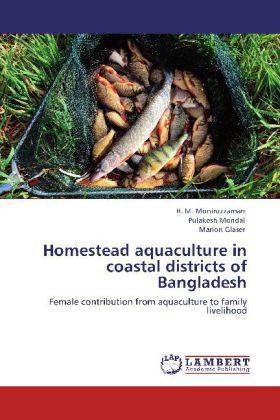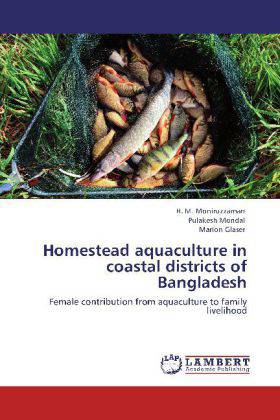
- Afhalen na 1 uur in een winkel met voorraad
- Gratis thuislevering in België vanaf € 30
- Ruim aanbod met 7 miljoen producten
- Afhalen na 1 uur in een winkel met voorraad
- Gratis thuislevering in België vanaf € 30
- Ruim aanbod met 7 miljoen producten
Zoeken
Homestead aquaculture in coastal districts of Bangladesh
Female contribution from aquaculture to family livelihood
H. M. Moniruzzaman, Pulakesh Mondal, Marion Glaser
Paperback | Engels
€ 64,45
+ 128 punten
Omschrijving
Women in Bangladesh primarily involved in household activities take care of children, food cooking, washing of clothes etc. In addition to these, they also engaged in other activities like agriculture, poultry and fisheries. In Bangladesh, the capability of women in adopting and implementing aquaculture development technologies is well substantiated, although their full potential has yet to be explored. To ensure sustainability of aquaculture, it is imperative to understand women's role in aquaculture. Women involvement in aquaculture is important in the sense of their physical contribution as well as their empowerment on the background of their familial and social life. This study was conducted for observing women contributions to aquaculture and the impacts of homestead aquaculture on their livelihood in the south west coastal part of Bangladesh. In the study area, 95.5 % families are headed by men and 4.5 % by women. Over 90 % of the respondent women revealed that their yearly income increased to the previous years due to the involvement of women in aquaculture.About 71 % of the total number of interviewed women get benefit from aquaculture.
Specificaties
Betrokkenen
- Auteur(s):
- Uitgeverij:
Inhoud
- Aantal bladzijden:
- 84
- Taal:
- Engels
Eigenschappen
- Productcode (EAN):
- 9783847313823
- Verschijningsdatum:
- 12/12/2011
- Uitvoering:
- Paperback
- Afmetingen:
- 152 mm x 220 mm
- Gewicht:
- 136 g

Alleen bij Standaard Boekhandel
+ 128 punten op je klantenkaart van Standaard Boekhandel
Beoordelingen
We publiceren alleen reviews die voldoen aan de voorwaarden voor reviews. Bekijk onze voorwaarden voor reviews.







